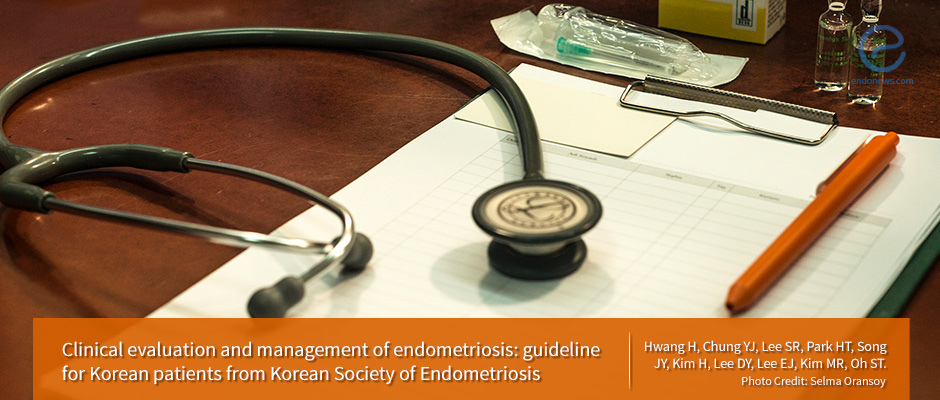The diagnosis and management of endometriosis in Korea
Nov 21, 2018
A study covering domestic epidemiology and conditions for new guidelines for the Korean Society of Endometriosis
Key Points
Highlights:
- This study by the Korean Society of Endometriosis provides 71 evidence-based recommendations
- The guidelines emphasize how to evaluate and manage the disease according to its role on infertility, the treatment reoccurrences, the situation in asymptomatic women, endometriosis of adolescents and menopausal women and a possible association of endometriosis with cancer.
Importance:
- The Korean Society of Endometriosis provides seventy-one evidence-based recommendations as a guideline to Korean clinicians.
What's done here:
- To emphasize KSE recommendations of endometriosis, authors reviewed the international and Korean literature and produce evidence-based guidelines depending on the importance of results on analytic studies and experts opinions.
Key Results:
Some of the recommendations supported by meta-analyses or multiple randomized trials:
- There is no evidence that medication has superior over others for endometriosis-associated pain
- Hormonal treatment should not be prescribed for pain control before surgery
- Surgical removal of laparoscopically diagnosed endometriosis can be helpful for pain
- Surgical resection of ovarian endometrioma as it is more efficient to prevent pain recurrence than drainage or coagulation.
- For ovarian endometrioma, KSE recommends cystectomy compared to drainage or vaporization, which both reduces pain and recurrence and allows histological diagnosis.
- Ovarian endometrioma, when ≥3 cm in women with pelvic pain, should be removed. In the case of infertile women with endometrioma (≥3 cm), the evidence is not enough to support that cystectomy prior to ART increases the pregnancy rate
- Post-operative hormone therapy should be prescribed for women who do not plan a pregnancy.
- When re-operation for recurrent endometriosis is considered, it should be known that re-occurs in 20–40% of cases, similar to the recurrence rate after the first operation.
- For patients who want to conceive naturally after the operation, adjuvant hormonal treatment should not be prescribed
- For the infertile women with endometriosis, the ovarian function should not be suppressed by hormonal treatment to improve fertility
Lay Summary
The Korean Society of Endometriosis has scrutinized the present published literature of endometriosis in the domestic and international platform to provide new guidelines and the clinical management of the disease. The study was recently published in the journal "Obstetrics and Gynecology Science".
While analyzing the data on diagnosis and treatment of endometriosis, they categorized their recommendations depending on four grades scale as Meta-analysis or multiple randomized trials, large non-randomized trials or case-control/cohort studies, non-analytic studies or case reports/series and expert clinicians experiences.
Although the authors mentioned the clinical, genetic, environmental risks and dietary factors affecting the occurrence of endometriosis at the beginning of the manuscript, their recommendations condensed on clinical diagnosis methods such as laparoscopy, ultrasonography, magnetic resonance, and biomarkers, as well as infertility follow-up of a diagnosed endometriotic patient.
The group also noted for preoperative care, medical treatments, and the exact time for surgery in accordance with the age and reproductivity of patients comparing KSE guideline recommendations. The periods in women lifetime such as adolescent, reproductive or postmenopausal endometriotic patients were also their point of interest.
Some of the recommendations supported by meta-analyses or multiple randomized trials are summarized in the key results above.
After meticulously prepared recommendations, the authors concluded this study is the first structured and evidence-based review of Korea.
Research Source: https://www.ncbi.nlm.nih.gov/pubmed/30254991
Infertility pelvic pain dysmenorrhea endometrioma deep infiltrating endometriosis prevalance adolescent endometriosis Korean endometriotic patients laparoscopic surgery adjuvant hormonal therapy

